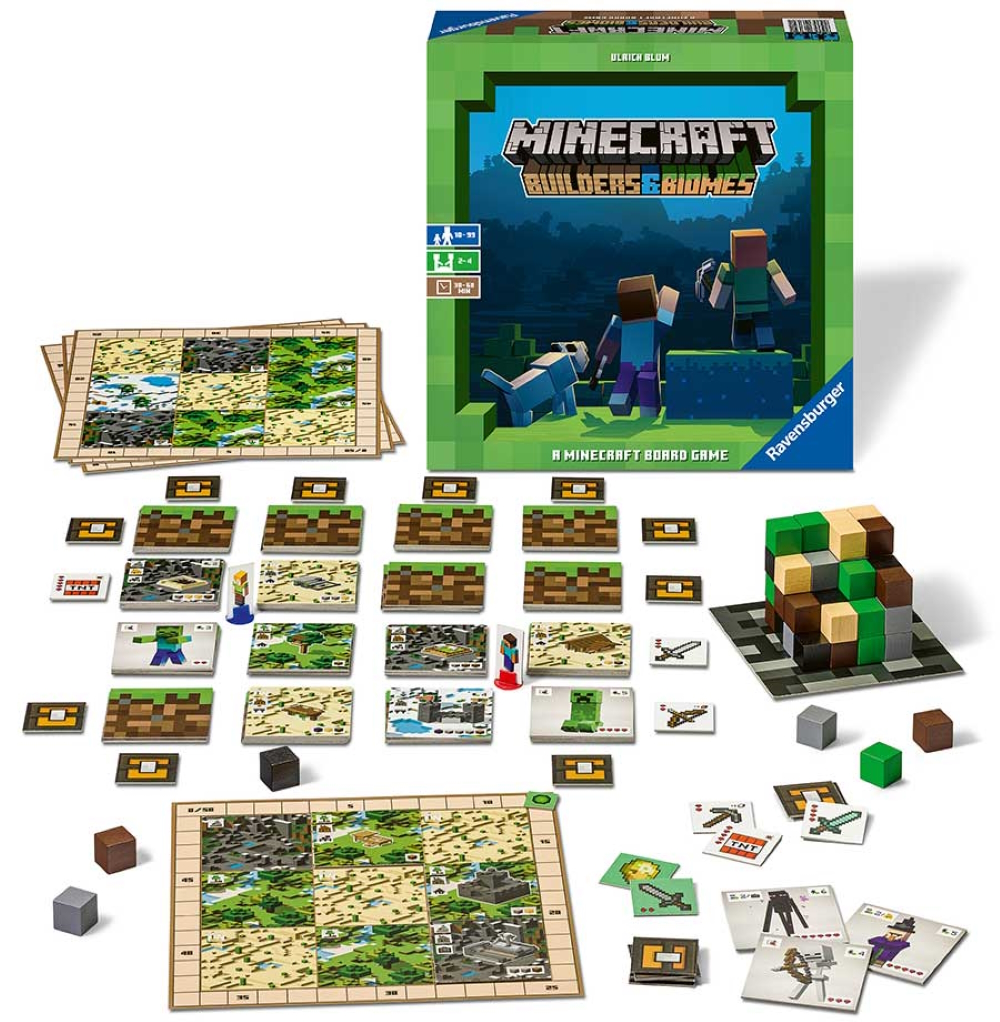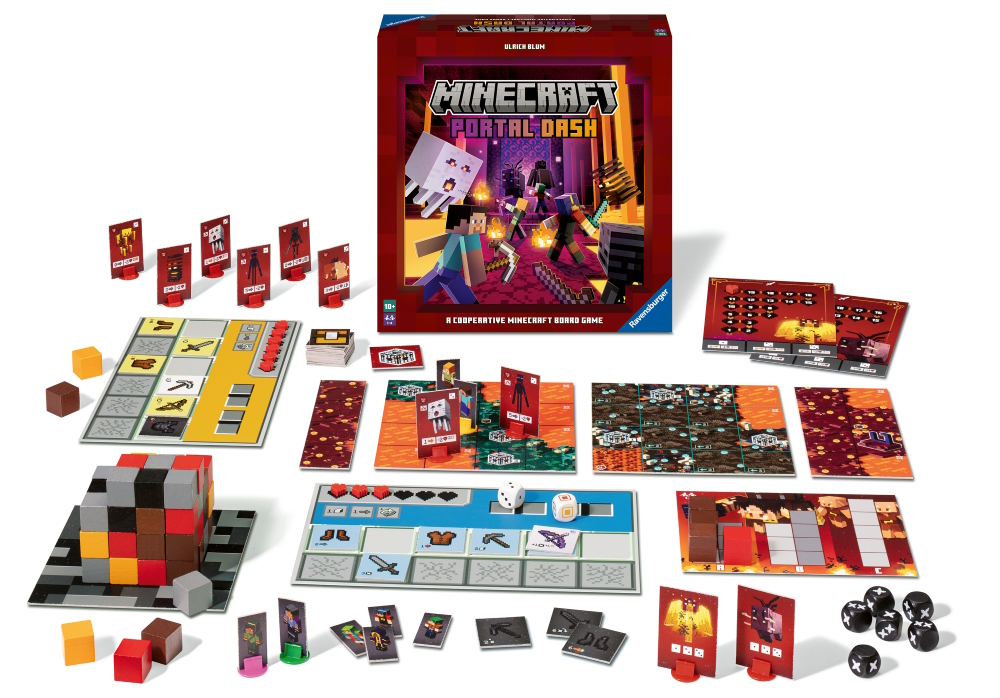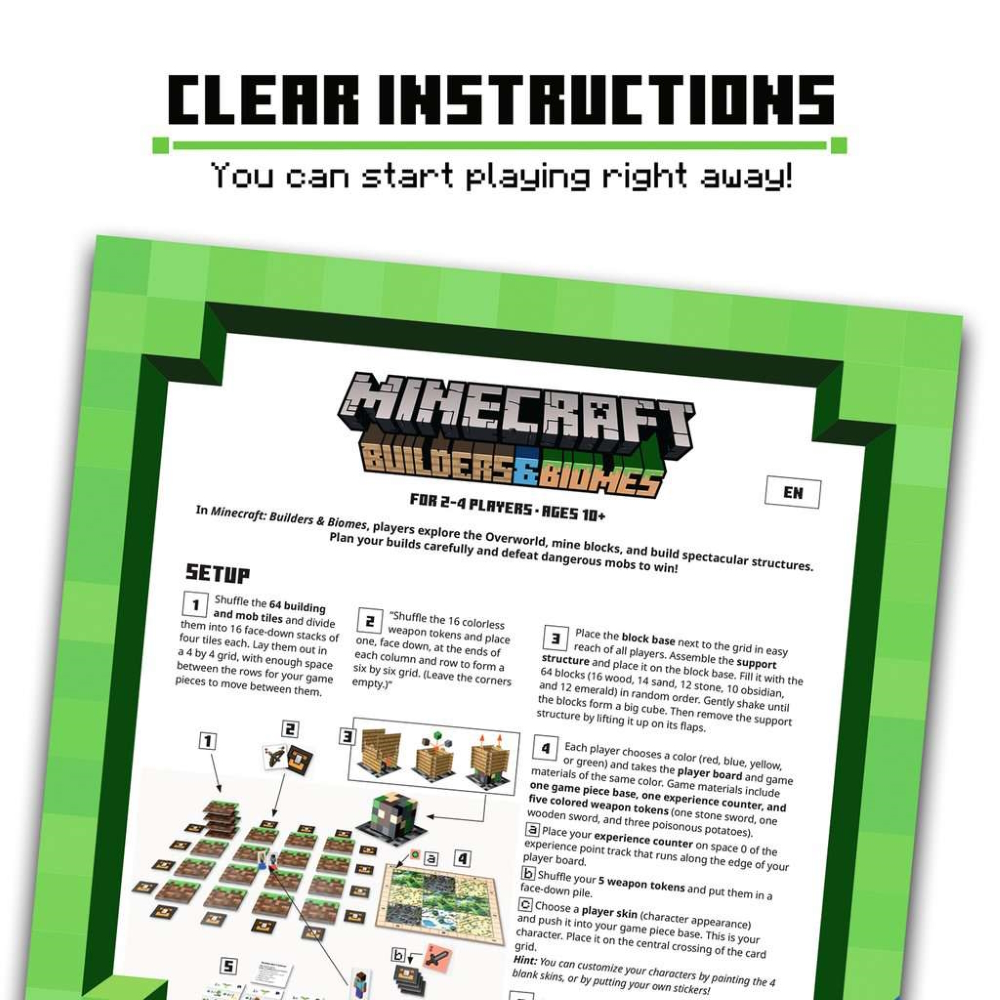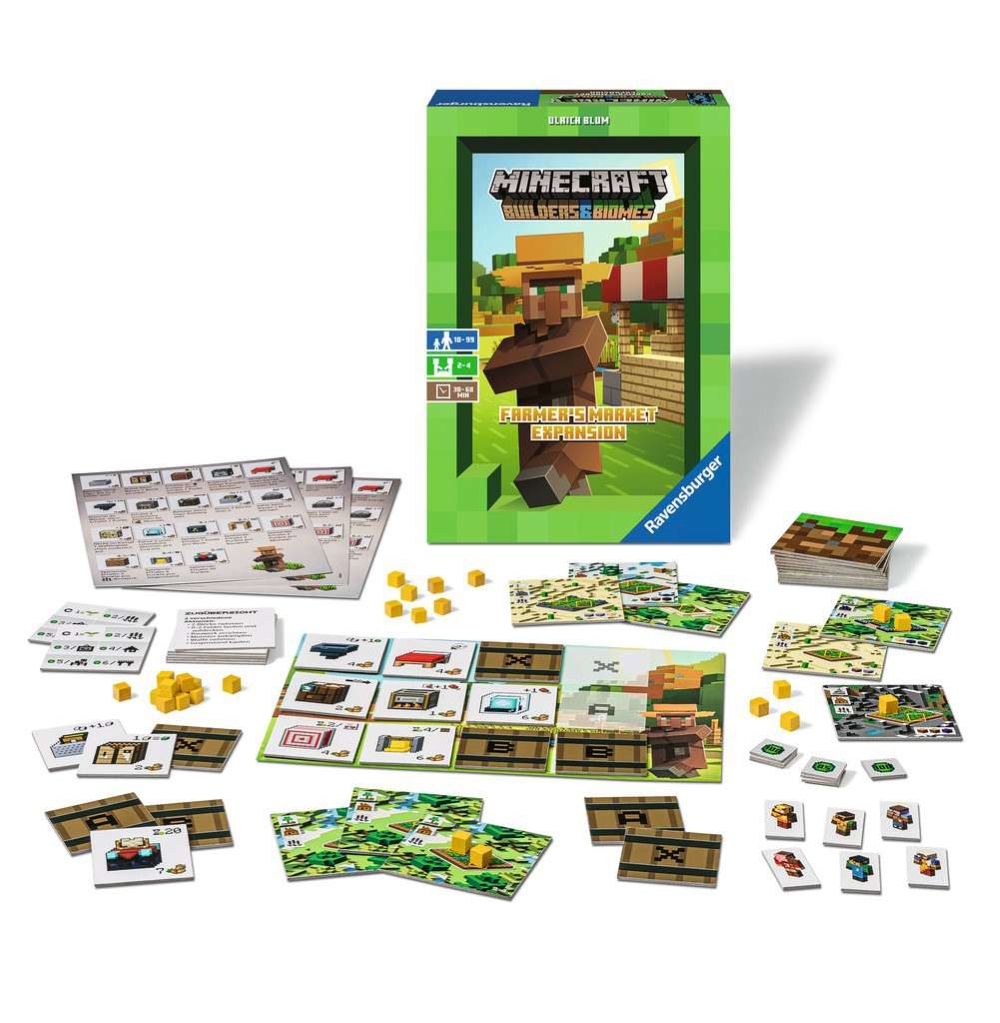Ulrich Blum
Board Game Designer
Switzerland / Germany
The various board game versions of Minecraft („it is the best-selling video game in history, with over 238 million copies sold and nearly 140 million monthly active players as of 2021 and has been ported to several platforms“ - Wikipedia) this native Swiss became famous for. He’s a renowned specialist for digital, analog and hybrid games and has set himself a high standard as a developer: „Games should tell a story and give me as well as every player a special experience!“
Ulrich Blum
Board Game Designer
Switzerland / Germany

A serious accident was the original cause for his career as a professional board game designer to take shape. In 2004 cyclist Ulrich Blum (* 1979 close to Zurich) was hit by a car. As a result, he could only move around on crutches for a year. During this time, the victim was unable to work in his jobs as a trained cook or studied actor. Living on welfare the man had very little money, although a lot of time. In order not to go crazy a proven occupation was the obvious choice that should prove forward-looking: from a very early age on he was used to play modern board games with three siblings in his family and „developed rule variants for existing games when I was ten years old or even earlier. By the time I was twelve I was developing news games and making prototypes myself“ (pegasus.de). It would still take a couple of years up until the enthusiasm for this topic should bear fruit. But in 2009 the lover of theatre, opera, literature, classical music and singing in a choir won the Game of the Year scholarship for new game designers. By 2011 he who plays one to three board games a week and ownes roundabout 300 himself became a full time game designer. Ulrich Blum works for game publishing houses and clients like museums or business customers. It’s the latter he designs games for promotion like ‚Next Generation‘ which offers hybrid-adventure worlds by enriching real model railways with digital stories and content for example.
„In the beginning there is a vision, an idea of something I want to achieve“, Mr. Blum told brettspiel-news.de. „Based on this, I try to come up with something playable as quickly as possible. Then I test it on my own for a while. If the idea survives, the longest and most time-consuming phase follows, in which I improve the game step by step in countless iteration loops. At the beginning it's more about the big picture, then it gets further and further into the details. At some point, tests with other people besides myself are added, during which I mainly observe the emotions of the players. Towards the end comes the balancing and somewhere along the way I hope to have found a publisher with whom I can then fine-tune it until publication.“
Every year at least one new board game should be released by a professional designer. Because the single development takes between a few months and several years to complete he must stay on the ball to keep it rolling.
Ulrich Blum lives and works in Berlin (Germany).
www.ravensburger.de/produkte/spiele/familienspiele/minecraft-builders-biomes-26132/index.html
Interview March 2023
Playing for life: driven by the consideration of what could be done differently
INTUITION/IMAGINATION
How does intuition present itself to you – in form of a suspicious impression, a spontaneous visualisation or whatever - maybe in dreams?
Most commonly by the consumption of any (artistic) media. Something I see, read or hear might trigger a thought process resulting in an idea that I can use in a game.
Will any ideas be written down immediately and archived?
Usually yes - if the idea is still interesting after a few minutes .
?: How do you come up with good or extraordinary ideas?
At the very beginning of a project my approach is to produce many ideas without too much of a filter. Just coming up with a lot of suggestions quickly. In the second step I use the opposite mindset: filter all the ideas very critically and hope at least one idea survives that process.
?: Do you feel that new creative ideas come as a whole or do you get like a little seed of inspiration that evolves into something else and has to be realized by endless trials and errors in form of constant developments up until the final result?
Definitively the latter. The process described in the previous answer usually leaves me with just a general direction or a starting point. That seed needs a lot more ideas to grow and maybe change its form completely. Trial and error and the spirit of „fail faster“ are very important for my development processes.
What if there is a deadline, but no intuition? Does the first fuel the latter maybe?
Intuition and ideas are present always. But are they any good? A reasonable deadline can help to not get lost completely but just go with an idea and trust the process. Having said that, a too strict deadline will usually result in a product that could have been better when given more time.
INSPIRATION
What inspires you and how do you stimulate this special form of imaginativeness?
Playing a lot of games is the best way for me to be inspired for my games. But it’s equally important for me to immerse myself in other art forms and media. In both cases it’s important to not only look for things I admire, but also ask questions like “why is no-one doing XYZ? Why is this creation solving a specific problem in a peculiar way (that I might dislike) instead of another one (usually an idea I have in that moment)?
?: How do you filter between ideas worthwhile pursuing and bad ones that you just let go of?
In the first step it’s just intuition fueled by experience. Then, If I find an idea interesting I try to test it as soon as possible. I reduce the idea down to a minimally playable game. That means: I give it a very ruff physical form (a quick doodle of a game board, a few symbols on some index cards, etc.) and I try to play two or three turns. If there is nothing interesting happening in those very few actions, then it’s time to look for another idea or to at least change the idea significantly.
Has it to appeal to you primarily or is its commercial potential an essential factor?
That depends on the project entirely. Ideally there is at least a bit of both.
Do you revisit old ideas or check what colleagues/competitors are up to at times?
I do look at older ideas of mine from time to time. Especially if I run into a problem that I remember having had before. Then I go back and see how I solved it back then.
Being up-to-date with what colleagues are doing is very important to me. In board games it is very common that game designers meet and play each others’ prototypes. Getting feedback from professionals is very valuable and distinctly different from the one of „normal“ test players.
CREATIVITY
Which time/place/environment suits your creative work process the best (tranquillity or pressure) and which path do you take from theory/idea to creation?
I try to have various projects going on at several stages. One might be in the very early stages which requires a lot of creativity to progress still. Such kind of work can’t be done eight hours a day. So it’s good to have one or more other projects cooking, which also require more routine tasks like building a prototype, writing a rule of the game, test playing etc. In that mode I can switch back and forth between creation and execution. So I can do the more creative work, when it „feels right“.
What is better in the realization process: speed and force creativity i.e. grasp the magic of the moment, or a slow, ripening process for implementation/elaboration?
Being fast can have its merits in the early stages of a project, when you iterate very quickly or ride the positive wave produced by having a great idea. But once that settles, a slow approach is definetly preferable to me.
?: Do you have any specific strategies you use when you are feeling stuck creatively?
I try to define the problem as clearly as I can. Then I work on something else for a while. Ideally another project, or at least another aspect of the same project. Once I feel the time is right, I return to the problem. Usually it is a lot easier to come up with other approaches then.
How important are self-doubt and criticism (by others) during such a process i.e. is it better to be creative on your own, only trust your own instincts, or in a team?
Both are important. I try to be brutally honest with myself and make changes when needed. But at a certain point in time feedback from the outside is absolutely crucial.
Should a creative always remain true to him-/herself including taking risks & going against the flow or must one, for reasons of (commercial) survival, make concessions to the demands of the market, the wishes of clients and the audience’s expectations?
It’s important for me to have a vision as well as trying to be innovate. But a creation doesn’t exist in a vacuum. It’s always received in relation to other works in the genre. So it might happen that it features too much innovation up to the point where the audience doesn’t have a framework to understand it.
How is innovation still possible if one has established a distinctive style and, just in case, is it good to be ahead of one’s time even one hazards not being understood?
I don’t feel I have developed a distinctive style that would limit me. I have a few underlying topics I am interested in, but they can take on many shapes. I try to push boundaries at least a little bit with everything I do, while not sacrificing the accessibility.
When does the time come to end the creative process, to be content and set the final result free - or is it work-in-progress with an endless possibility of improvement?
There absolutely has to come the time where I let go and accept that the game is what it is - with all the flaws I can see in it already. Considering that I try and fail better next time.
?: In case of failure or - worse - a creativity crisis how do you get out of such a hole?
Fail faster and fail forward. I try and analyze where the problems are and try to improve on those in my next game. That doesn’t mean failure isn’t frustrating. But at some point in time the frustration must be left behind and turned into a learning experience.
SUCCESS
Should/can one resist the temptation to recycle a ‘formula’ one’s successful with?
I don’t feel I have found that formula yet.
Is it desirable to create the ultimate/timeless work, but doesn’t “top of the ladder” bring up the question of “what’s next?” i.e. isn’t such a personal peak “the end”?
I have to design a game yet that I don’t see space for improvement if I revisit it later on. So this is not a question that is on my mind. I would count myself very lucky if I ever design a game that is received on that level.
MY FAVORITE WORK:
Minecraft Builders & Biomes. It is a board game in the world of Minecraft. Up until just a few years ago such licensed games didn’t have a very good reputation among gamers. But it was important to both Mojang Studios, the Swedish creators of the computer game Minecraft, and Ravensburger, the German publishing company for the board game, to create a game that was not just a marketing product but a great game in its own right.
Because of time constraints the development process was extremely intense with almost daily iteration cycles. But it was one of those rare occasions where everyone involved was truly passionate and motivated to create the best game possible.
By the sheer nature of this game as a licensed product and the need for it to appeal to a very wide audience, this is far from my most innovative designs. But the level of elegance in this design is something I always strive for, but have never before achieved to this degree.
For a large part of the audience this will be the first contact with „modern“ board game design and hopefully an entry point into a medium that has evolved tremendously in the last two decades. The fact that I and the whole team managed to do that in a way where the game does not only sell well (which isn’t a big surprise given the license), but is also received tremendously well, fills me with a lot of pride.



